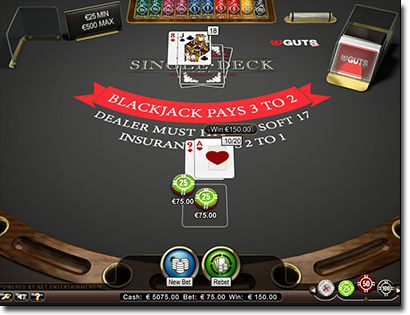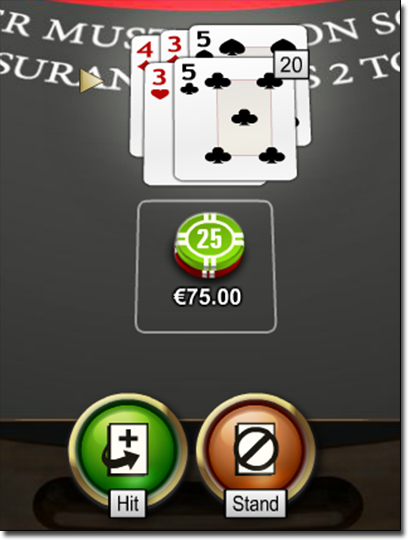Blackjack is much more than a game about accumulating totals or reaching as close to 21 as possible. It’s a game which requires a keen understanding of strategy, as well as knowledge of blackjack odds and probabilities and how they affect the house edge in 21.
Featured Casinos
In this article, we’ll first explain the rules of the game for the benefit of those who are new to the hobby. Then, we’ll examine rules variants to determine how they raise or lower the advantage that the house holds over the player. These facts won’t make you an automatic winner, but they will give you a form understanding of what to be aware of while sitting at the blackjack table.
Note: This page is intended for our international readers only. Online gambling is illegal in Australia as of September 2017 following the introduction of the Interactive Gambling Amendment Bill 2016, so for Australians the content on this page is informational in nature only.
Online blackjack sites with best ddds
For players who settle for nothing but the best player-friendly rulesets and odds in online blackjack, we’ve taken the time to identify and research the most favourable variations of 21 on the Web, available at only the most fair and reputable Internet casinos:
1/ All Slots Casino – $1600 welcome bonus
2/ G’day Casino – 100% unlimited welcome bonus
3/ Guts Casino – $400 welcome bonus
4/ Royal Vegas Casino -$1200 welcome bonus
5/ Jackpot City Casino – $1600 welcome bonus
All sites host a range of variations of real money blackjack to suit low-stakes and high-limit players or those seeking the most player-friendly rules. In addition, their blackjack titles are playable on computer, laptop, mobile and tablet devices – either via no download Instant Play through Web browsers, or through dedicated downloadable app or computer software.
How to play blackjack
 In order to understand blackjack odds, you must first know how to play the game. This might seem rudimentary to experienced players, but keep in mind that everyone started as a beginner at some point.
In order to understand blackjack odds, you must first know how to play the game. This might seem rudimentary to experienced players, but keep in mind that everyone started as a beginner at some point.
The game of blackjack is played with a 52-card deck, and anywhere from one to eight decks can be used at a casino. Tens and face cards carry a value of ten, while cards ranging from two to nine are worth their face value. The numerical value of aces can either be worth one or eleven based on the player’s choice.
To determine the value of a hand, add up the cards held by the player or dealer. If a hand is comprised of an ace and any 10-point card, it’s considered a “blackjack” (which beats all other hands).
The player begins by making a wager. Then, the player is dealt two cards face up, while the dealer receives two cards (one face down, which is known as the “hole card”). If the dealer is showing an ace, the player will have the option of buying insurance against a possible dealer blackjack. Insurance can be purchased up to half of the original wager, and it pays 2 to 1.
After insurance has been offered, the dealer will look at his hole card to see if he has a blackjack. If he does, then all other wagers lose (a simultaneous player blackjack will result in a push). If he does not, then the game continues.
The player now has several choices available. These include:
Hit – Player receives another card. He can receive more cards as long as his total does not exceed twenty-one.
Stand – The player chooses not to receive any additional cards.
Double – The player doubles his bet but only receives one additional card.
Surrender – The player gives up on his hand, getting back half of his initial wager. This option is not available at all casinos.
Split – A player holding two 10-point cards or any pair may choose to double his bet and split. This means the two cards are separated into distinct hands, with an additional card being dealt for both. The hands are then played out as normal, although some casinos may have rules that forbid certain action (such as splitting aces).
After the player has finished with his cards, the dealer will reveal their hole card. At most casinos, the dealer will be required to take additional cards if their total is 16 or less. The hands are then compared, and the individual who gets closest to 21 without going over is declared the winner and receives an even money payout (while a player blackjack traditionally pays out at 3 to 2).
Odds of winning at blackjack
A number of factors affect the house edge in 21. These include:
– Does blackjack pay 3 to 2 or 6 to 5?
– How many decks are used by the dealer?
– Does the dealer hit or stand on a soft 17?
– What are the rules regarding surrender?
– Can the player hit on split aces?
– Can the player resplit aces?
– Can the player double after a split?
– How many times can the player resplit?
– On a dealer blackjack, does the player lose all bets or only the original wager?
Now let’s look at a few example of the house edge in blackjack. The cases below assume that the player uses proper strategy and the dealer shuffles after each hand.
One of the best case scenarios for the player involves the following rules: a single deck of cards is used; the dealer stands on a soft 17; the player can double on any first two cards, and they can also double after a split; up to four hands can be resplit; split aces can be hit or resplit; a dealer blackjack only costs the player their initial wager, the surrender rule is in effect; and blackjack pays out at 3 to 2. When these rules are in place, the house edge is -0.37292% (which favours the player). While this sounds promising, don’t expect to find any casino whose rules actually reduce the house edge below zero.
One of the worst case scenarios involves the following rules: 8 decks of card are used; dealer stands on a soft 17; player can double only on the first two cards and not after a split; split aces cannot be hit or resplit; all bets are lost against a dealer blackjack, blackjack pays 6 to 5; the surrender option in not allowed. With all these variables in place, the house edge is 2.07343%.
Blackjack odds and probabilities can seem daunting to beginners, especially those who don’t care much for math. Persistence will pay off, however, as blackjack is definitely a game that rewards hard work and study. While there’s no way to eliminate the house edge in 21, perfect play and a mastery of the rules should allow you to make a profit more often than not.
